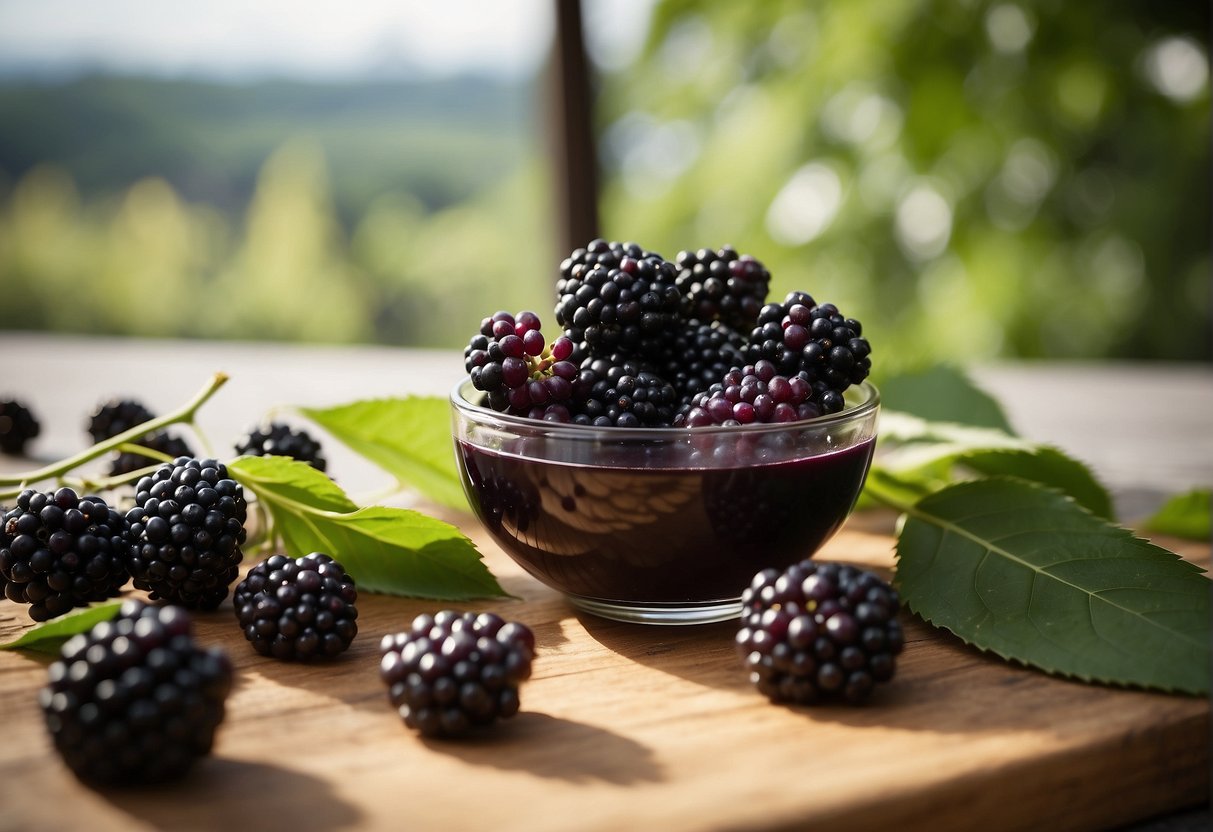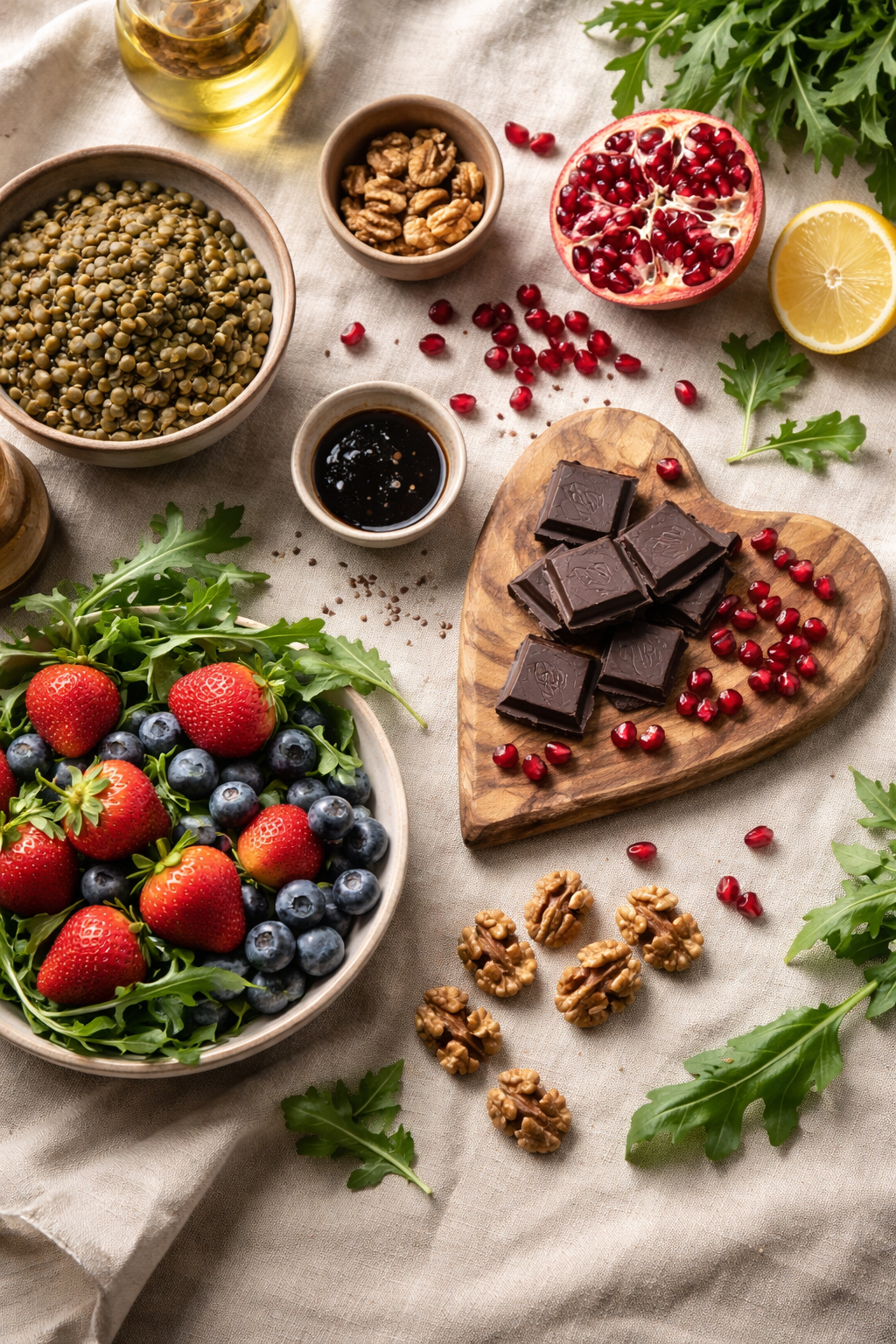When it comes to superfoods, one unassuming berry stands out from the crowd. The elderberry. These vibrant purple berries may seem ordinary. Ancient civilizations have revered them for centuries due to their healing properties. Modern science is now beginning to recognize the powers of this rich superfood.
With their hue indicating high levels of anthocyanins, elderberries are among the most antioxidant rich fruits globally. However, their antioxidant benefits are the tip of the iceberg when it comes to the value of elderberries. Alongside immune boosting vitamin C and inflammation-reducing vitamin E, these potent berries also boast minerals.
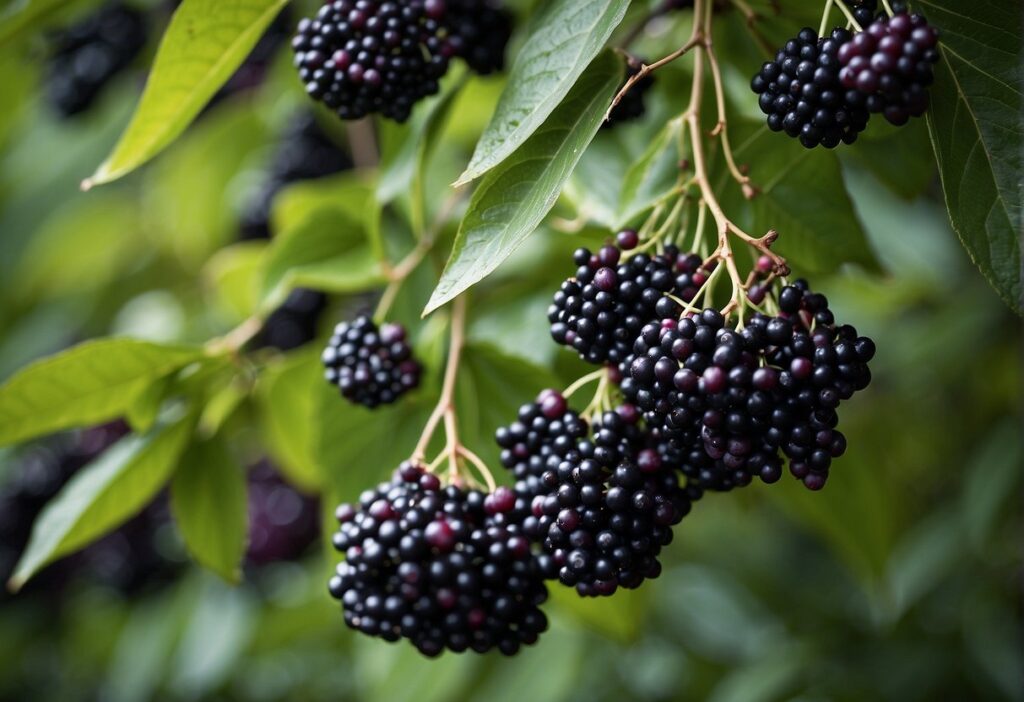
From alleviating symptoms of colds and flu to reducing the risk of diseases, elderberries’ antioxidant and nutritional properties make them a formidable addition to your diet. Whether you want to incorporate some superfood goodness into your meals or simply indulge in their fruity taste, fresh elderberries should definitely be on your list of must-try foods.
Join us as we explore the history and cultural significance of this antioxidant-packed berry, and discover how to select and procure quality elderberries and delve into their unparalleled nutritional benefits. You’ll also gain insights into storing your harvest of elderberries so you can enjoy their health-boosting effects throughout the year.
Prepare yourself to harness the power of elderberries from nature!
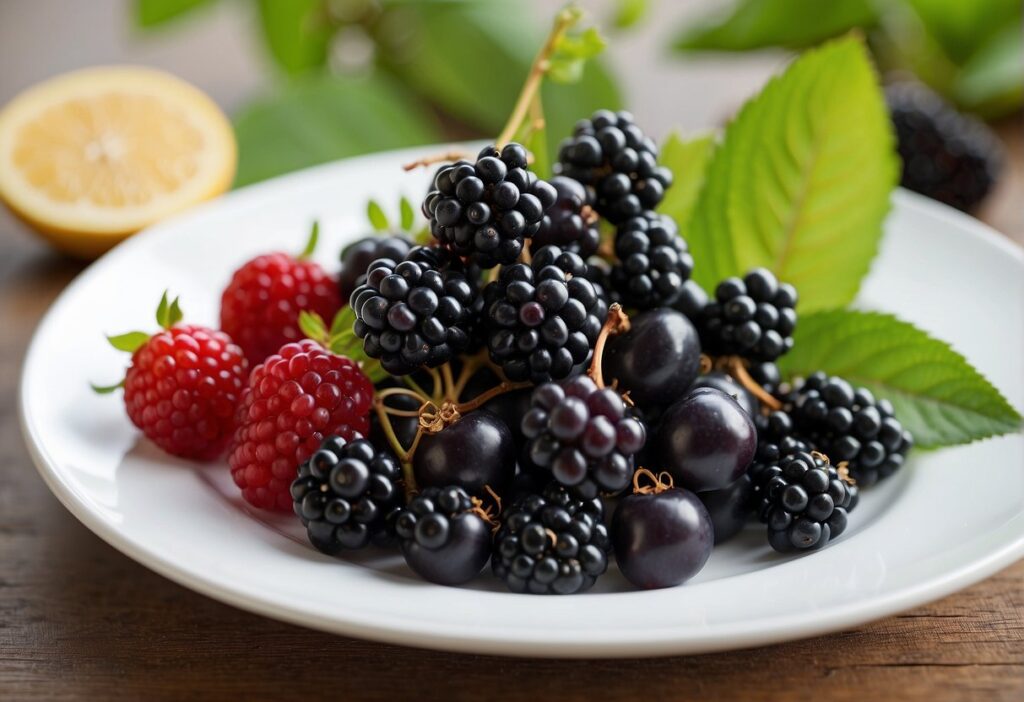
The Mighty Black Elderberry
Among the different types of elderberries, the black elderberry stands out as a powerhouse of antioxidants. This dark purple fruit has been revered in medicine practices for centuries and it’s easy to see why.
Historical Use by Indigenous Peoples and Ancient Civilizations
Our ancestors recognized the healing properties of elderberries. Native American tribes used these berries to address infections and fevers. The ancient Egyptians also viewed elderberries as symbols of health and longevity. Even Hippocrates, known as the “father of medicine ” acknowledged the benefits of elderberries considering them his personal medical toolkit.
Immune Boosting and Antiviral Characteristics
In today’s times, modern research is confirming what traditional healers have advocated. Black elderberries are excellent, for bolstering our immune system. Studies demonstrate their capacity to enhance the body’s natural defense mechanisms while combating threats. Notably, a clinical trial revealed that older individuals who consumed black elderberry extract experienced durations and milder symptoms of influenza compared to those given a placebo.
Packed with Anthocyanins and Other Helpful Compounds
The strong antiviral and immune-boosting effects of elderberries are mainly due to their antioxidants and various phytonutrients. Among them, anthocyanins stand out. These powerful pigments give the berries their color. Besides anthocyanins, elderberries are rich in vitamin C, acids and a range of other compounds that team up to combat free radicals and reduce inflammation.
What Should You Consider When Consuming Raw Elderberries?
Given the advantages, you might be tempted to pluck some black elderberries straight from the bush. It’s essential to remember that raw elderberries contain glycoside, which can release cyanide if eaten. However, cooking eliminates these glycosides making cooked dishes safe to eat. Alternatively, you can choose concentrated juices or supplements that have been processed to remove any elements.
Clearly, when it comes to antioxidant strength and immune boosting abilities, black elderberries stand out above the rest.
In the following section, we will discuss how to identify, gather and select the elderberries for getting the most out of their incredible nutritional benefits.
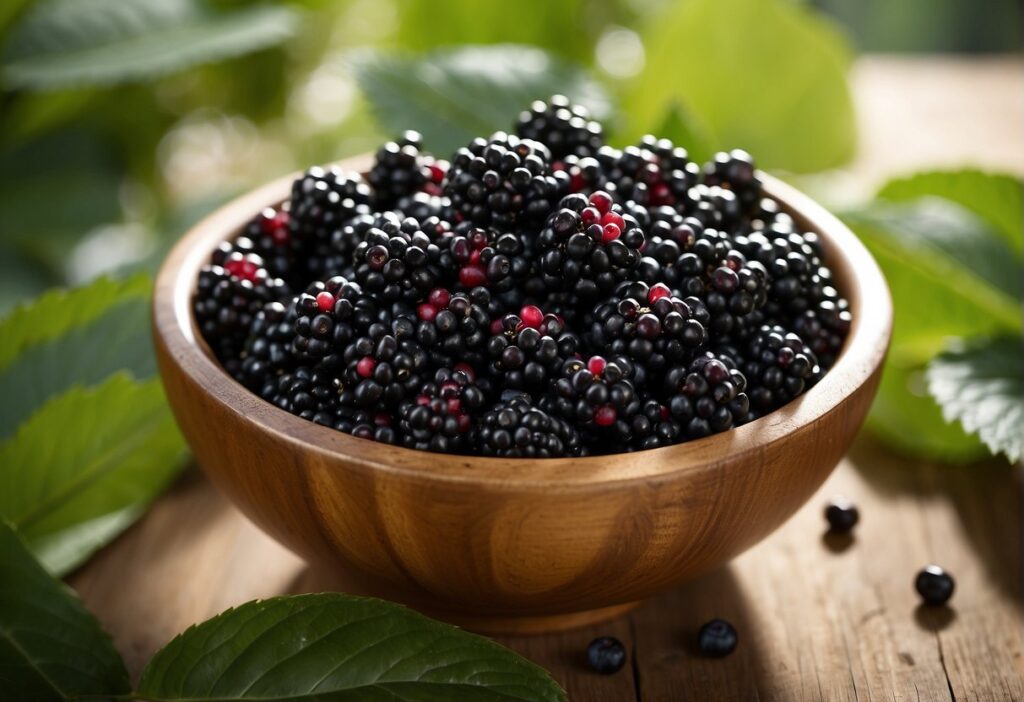
Harvesting and Picking Fresh Elderberries
Spotting Ripe Elderberries
Given their antioxidants and immune-boosting properties, it’s an idea to gather some fresh elderberries when they’re fully ripe.
How do you know when an elderberry is ready, for picking? Initially these small fruits appear vibrant with leafy clusters that almost look too green to eat. As they mature over a weeks, the berries gradually shift to a red hue. However, it’s only when the entire cluster turns into a purple black color that the elderberries are perfectly ripe.
It’s best to avoid clusters containing any lingering reddish berries as these will be very sour and not pleasant to eat. A bunch of elderberries should have a consistent shade similar to that of a blackberry or plum. When gently pressed, the individual berries should feel soft and juicy while still maintaining their shape.
Timing is crucial in harvesting elderberries at their peak ripeness. These rich berries reach maturity around late summer or early fall. However, the exact timing for harvesting may vary depending on factors such as climate conditions, altitude and regional differences.
The optimal approach is to keep a watch on the bushes starting around mid-August, checking them weekly for that distinct dark color.
By assessing their ripeness and choosing the time for harvesting, you can obtain fresh elderberries packed with antioxidants at their peak of flavor and nutrition.
In the following section, we will discuss techniques for picking elderberries to ensure your harvest remains plump and flawless.
Nutritional Benefits of Fresh Elderberries
With their hue and robust taste, it’s evident that fresh elderberries are bursting with nutrients. What exactly sets these berries apart as a superfood? Let’s delve deeper into their profile filled with vitamins and antioxidants.
| Nutrients | Amount in 100 grams | % Daily Value |
|---|---|---|
| Calories | 73 | 4% |
| Carbohydrates | 18.4 g | 6% |
| Dietary Fiber | 7 g | 25% |
| Vitamin C | 36 mg | 60% |
| Fat | 0.7 g | 1% |
| Protein | 1 g | 2% |
Note: The % Daily Value is based on a 2,000-calorie diet. Your daily values may be higher or lower depending on your calorie needs.
Abundant in Antioxidants
One striking feature of elderberries is their color. This intense royal hue indicates a concentration of antioxidants, anthocyanins, and flavonoid antioxidants. Indeed, elderberries stand out among fruits with their antioxidant content due to the presence of anthocyanins.
However, anthocyanins are not the only antioxidants in elderberries. These berries also offer a dose of vitamin C, another antioxidant known for supporting immune function and skin health. With their antioxidant properties, elderberries play a role in combating oxidative stress and protecting against free radical damage.
Elderberries are not just rich in antioxidants but are also packed with vitamins and minerals. They contain boosting vitamin B6 bone-strengthening vitamin K and energy-enhancing vitamin B5. Additionally, elderberries provide inflammatory vitamin E, along with beneficial plant compounds like quercetin and chlorogenic acid. These berries also offer minerals such as iron, potassium, phosphorus, copper and folate.
Thanks to their content, elderberries have been valued for their health benefits throughout history. Recent studies suggest that elderberries may help reduce inflammation, enhance the system’s response and protect against viral infections. Researchers are exploring the anthocyanins in elderberries for benefits related to heart health, diabetes control, cancer prevention, improved vision, and relief from conditions like bronchitis.
While further research is necessary to grasp the healing properties of elderberries, one thing is certain – these super berries are a powerhouse due to their abundance of antioxidants, vitamins and minerals. They certainly deserve recognition, alongside superfoods.
Tips, for Storing and Preserving Elderberries
Elderberries have a structure and are packed with antioxidants making them highly perishable. To maintain their freshness and nutritional value, proper storage is essential. Whether you’ve harvested your berries or bought them from a farmers market, these guidelines will help you savor the exceptional flavors and health benefits of elderberries throughout the year.
Proper Ways to Store Fresh Elderberries
The secret to preserving elderberries lies in controlling temperature and humidity. Unwashed elderberries can stay fresh for 3-5 days when stored in the fridge without washing them. For storage, remove any damaged berries then lay out the berries on a baking sheet lined with paper towels to absorb moisture.
When refrigerated in a covered container using this method, fresh elderberries can last up to 2 weeks. Remember to let them come back to room temperature before consuming for taste.
Freezing and Drying Techniques
If you want to preserve elderberries for a longer period, freezing is a method for locking in their freshness and antioxidants. Simply spread the berries on a baking sheet, and freeze until solid, then transfer them to airtight freezer bags while removing as much air as possible. Frozen elderberries can be kept for up to one year.
If you prefer, you could also choose to dry out your elderberries for rich storage. You can use a dehydrator for this or set your oven to its temperature to gradually remove moisture over a span of 12-24 hours until the berries become wrinkled and tough. Keep the dried elderberries in a container in a dark spot for up to one year.
For a more versatile option, think about transforming your elderberries into juices or concentrates. Just simmer the berries with some water until they release their juices. Filter out any solids. Enjoy the juice as is or cook it down further to create a concentrate.
You can store elderberry juice and concentrates for up to a year. By keeping these kitchen essentials on hand. you’ll always be prepared to whip up some syrup or add some antioxidant goodness into beverages, baked treats and more.
By employing storage and preservation techniques, you can savor the flavors and nutrients of fresh elderberries throughout the year.
Fresh Elderberries: A Genuine Superfood Sensation
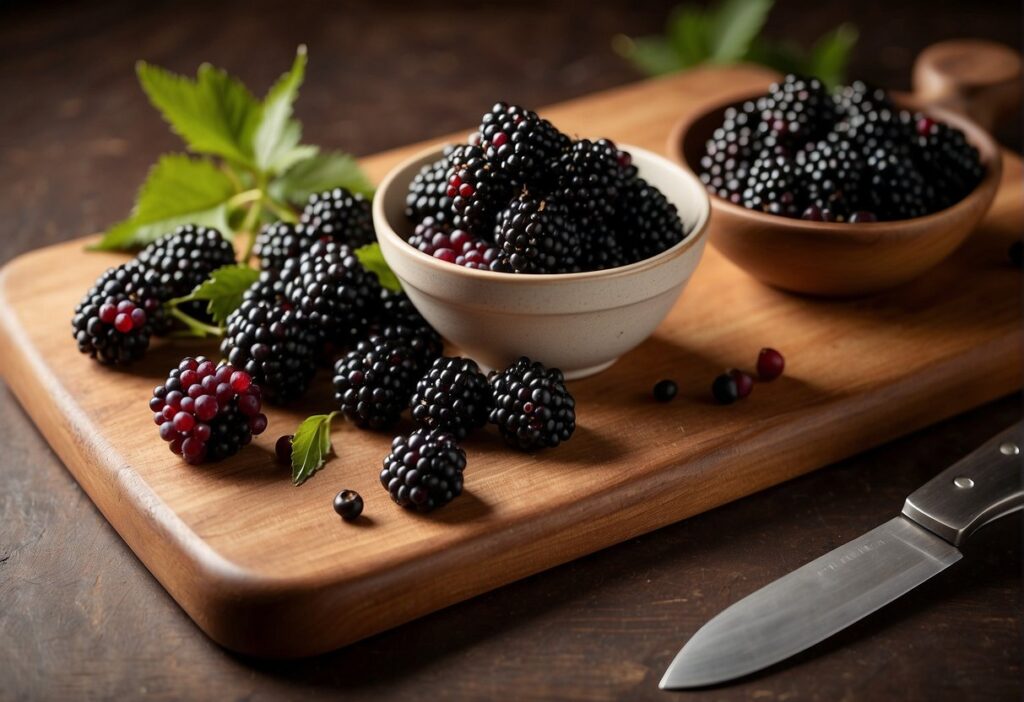
It’s fresh elderberries that have rightfully secured their spot as one of the potent superfoods globally.
These purple berries certainly offer their share of antioxidants like anthocyanins and vitamin C, helping to boost immunity and fight off radicals and infections.
The benefits of elderberries don’t end there. They also offer plenty of inflammatory properties and vitamins that strengthen bones as well as essential minerals that work together to support overall health. Their vibrant color is a sign of their ability to combat diseases.
From easing flu symptoms to reducing the risk of chronic diseases, fresh elderberries are making waves in the world of wellness. Their flavor complements both sweet and savory dishes making them not only nutritious but also delicious.
Whether you gather berries yourself or purchase elderberries from local sources, make sure to properly identify, harvest and store them to preserve their antioxidant content. With this superfood by your side achieving incredible health and unstoppable vitality has never been more accessible or delightful.
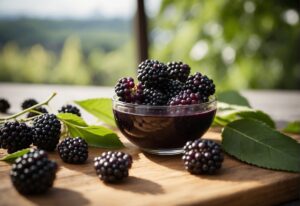
*We may earn a commission for purchases made using our links. Please see our disclosure to learn more.

